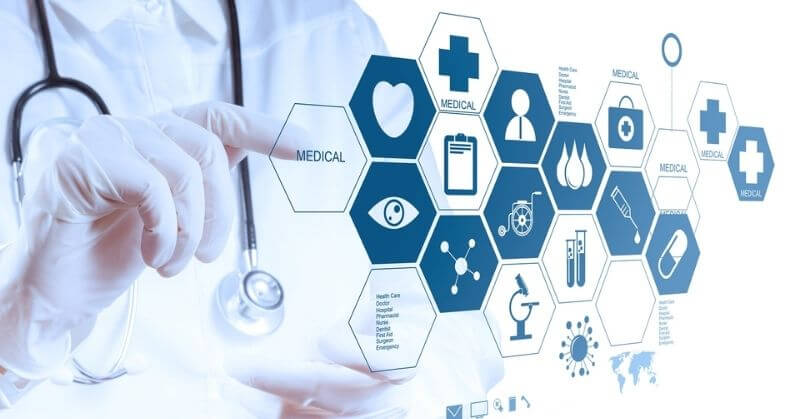In the last few years, there has been a lot of change in the healthcare industry. The widespread use of technology has had a huge impact on how hospitals and doctors operate. From electronic medical records to telemedicine and mobile health apps, technology is playing an increasingly important role in the delivery of healthcare services. This post looks at how technology is changing the healthcare industry and what that means for patients and businesses alike.
Training And Education

Doctors and medical students of the future will be very different than their counterparts today. Emerging technologies such as virtual reality and advanced computer modeling can offer a far more immersive learning experience for those who are training to become doctors. For example, surgeons in training could use simulation software to practice complex surgeries on 3D models or mannequins instead of living patients or animals. These types of innovative tools have been shown to increase surgical skill, accuracy, and confidence as well as make it easier for trainees to learn from their mistakes.
Recruitment

The technology boom has attracted many talented and skilled workers away from the healthcare sector, particularly doctors and nurses. With such a high demand for tech skills, companies like Facebook and Google can offer top salaries to employees who come from medical backgrounds. This has left hospitals scrambling to look for people with these hard-to-find tech skills. They are using new digital tools to recruit potential candidates by posting open positions online and through social media channels like Twitter and Instagram. Another recruitment strategy involves hiring recent college graduates in tech-related fields and offering them training programs in nursing or other clinical specialties so they can work directly with patients in an educational capacity while gaining needed experience in their field of study.
These new recruiting strategies are affecting every aspect of the healthcare industry, from home caregiving to porter recruitment and retention. In addition, they are helping to make the healthcare sector more tech-focused overall.
Data Collection And Analytics

One of the biggest challenges facing healthcare providers is managing and analyzing large amounts of data. This includes everything from electronic medical records to patient-generated health data or public health trends that can help hospitals or doctors better understand their patients and how they use the various services on offer. In using advanced technology such as artificial intelligence, machine learning, natural language processing, and business intelligence tools, companies can now analyze a wide range of datasets with greater speed and accuracy than ever before. In particular, tools like IBM Watson have been shown to be capable of reading through thousands of pages of medical reports in a matter of minutes and often suggesting possible diagnoses that humans might not have thought to explore.
Telemedicine

One of the most well-established examples of how technology is impacting healthcare today is the use of telemedicine. Telemedicine involves using modern communication tools such as video chat or text messaging to connect a doctor with a patient who may be many miles away. This system provides a vital link for patients in rural communities where doctors are few and far between. It can also provide substantial savings by reducing the need for appointments, emergency room visits, and expensive overnight stays when patients experience a medical emergency or problem that cannot wait until regular office hours. In fact, according to one report, telemedicine could save the U.S. healthcare system up to $38 billion per year.
Remote Patient Monitoring
Connected devices offer the ability to monitor patients even when they are at home. These can be anything from mobile phones or tablets that track exercise routines or sleep habits to wearable tech devices that keep tabs on vital signs like heart rate and blood pressure. The data collected by these products is often shared with the patient’s doctor so it can be used in decision-making processes related to care.
Artificial Intelligence Is The Next Big Thing

Artificial intelligence is being introduced into many different aspects of healthcare, from medication management to data processing. AI-powered robots have become popular in nursing homes where they are used for tasks like reminding residents of medications, helping them move around their rooms and stimulating conversation through social interactions.
For example, South Korea’s ROBOTHAUS runs a robot hospital that employs intelligent machines to assist nurses or do some basic medical testing at scales that humans couldn’t possibly manage alone. Researchers are also working on new ways to use artificial intelligence to diagnose health problems before they manifest themselves as physical symptoms, allowing doctors to intervene earlier and increase their patients’ chances of successful treatment.
Safer Surgeries
Last year, two companies received FDA approval for their surgical robots – the da Vinci Xi from Intuitive Surgical and the Starflex FLEX Robotic System from Mazor Robotics. Both systems are designed to enhance surgeons’ accuracy during certain keyhole surgeries. A long instrument is carefully inserted through a small incision to carry out very precise tasks.
By comparison, standard laparoscopic surgery relies on short instruments that only offer a limited range of motion. While this is fine for basic procedures like removing a patient’s appendix or gall bladder, it is not as effective when more delicate work is involved, such as prostate removal or reconstructive plastic surgery.
In addition to providing surgeons with greater control over the precision of their movements, both of these systems have the advantage of being able to move independently, following tracks laid out in front of them by the surgeon. This means that they don’t have to stay close to the patient’s body when they are in use, reducing the risk of unnecessary damage or injury during surgery.
More Efficient And Comprehensive Care
Technology also allows healthcare providers and patients to enjoy more comprehensive and convenient services. For instance, some medical practices are using apps to provide 24/7 access to patient records so that people can read up on their health history before seeing a doctor. Others have employed video chat systems for appointments so that patients don’t even need to leave the house in order to get vital support from healthcare professionals.
Follow Us: Facebook | Instagram | Twitter |
Entertales is on YouTube; click here to subscribe for the latest videos and updates.














